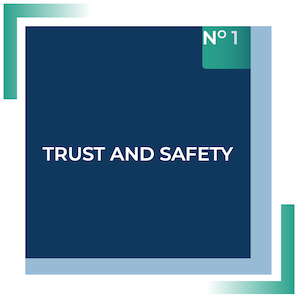Veteran Perspectives on Extremist Exploitation of the Military: Sources and Solutions
| by Amy Cooter
Our mission is to advance education, research, and intelligence analysis across the critical domains of domestic extremism, transnational emerging threats, and trust and safety tech policy, to drive change in pursuit of a more just world.
We go beyond the page to produce work that is not only academically excellent, but deeply policy relevant.
At CTEC, we examine the full spectrum of terrorism and extremism to provide bespoke analysis for tech and government clients.
We leverage experiential learning to train the next generation of intelligence and security researchers and analysts to respond to emerging threats.
CTEC is integrated into the curriculum of several Middlebury Institute degree and certificate programs, giving students opportunities to gain real-world work experience as paid research assistants:
CTEC focuses on three topics: Trust & Safety, Extremism, and Transnational Emerging Threats.

Trust and Safety is the policies, procedures, and technologies aimed at protecting users from harm, ensuring data security, and fostering a respectful and inclusive online environment. This involves the proactive identification and mitigation of risks related to privacy breaches, cyberbullying, fraud, and other forms of abuse, thereby promoting a safe and trustworthy user experience across digital platforms.
Extremism, as defined by senior fellow J.M. Berger’s seminal work Extremism, is “the belief that an in-group’s success or survival can never be separated from the need for hostile action against an out-group.” Our work focuses on the full spectrum of extremism, from lawful to violent. Critically, we understand terrorism to be a tactic, while extremism is a belief system.
Transnational emerging threats are the complex and evolving challenges that cross national borders, impacting global security and stability. These threats encompass a wide range of issues including cyber attacks, terrorism, organized crime, pandemics, climate change, and the proliferation of weapons of mass destruction. At CTEC, we are particularly focused on those threats posed by non-state actors. Addressing these threats requires coordinated international efforts, innovative policy solutions, and the integration of advanced technologies to detect, mitigate, and respond to incidents that can rapidly escalate and have widespread consequences for societies, economies, and international relations.
| by Amy Cooter
| by Stian Lothe
| by CTEC Staff
Our work is made possible by research grants and gifts from supporters. We appreciate your generosity.
Donate TodayStay up to date on CTEC’s activities!
Join Our NewsletterOpen positions at CTEC are advertised through the Middlebury Institute’s employment opportunities Handshake.
Current OpeningsHow will you change the world?
Get InfoWhat makes us different?
Visit Campus